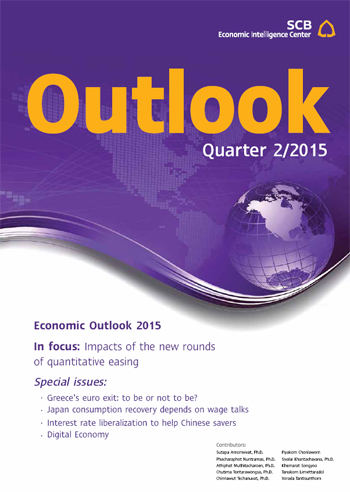Outlook Quarter 2/2015
EIC expects the Thai economy to grow by 3.0% in 2015. The Thai economy stalled during the first three months of 2015, in line with previous assessment, despite a strong recovery in tourism. Extra savings from cheaper oil have not translated to significantly higher household consumption. Particularly, Households’ purchasing power has been held back by subdued agricultural income and weakened private sectors’ confidence. Hurting confidence are uncertainties regarding reforms in tax policies such as land and building taxes, and delays in government budget disbursement, with only 27.8% completed in the first half of this fiscal year. Given these headwinds, EIC revised down forecasts for consumption and investment growth to 1.4 and 2.5% respectively. Moreover, the declining export values of products related to crude oil, such as oil products, chemical products, and plastics have led EIC to predict that export values will contract by 1.3% this year. Going forward, the timing of the Fed’s decision to raise its policy rate will be a crucial external factor that requires close attention. EIC expects the first rate hike in the past 8 years to take place in the third quarter. The increase in policy rate will result in stronger USD against all other currencies. In addition, the Thai baht will depreciate to 33.5 baht per US dollar by the end of this year. Regarding Thailand’s monetary policy, EIC predicts that the Bank of Thailand (BOT) will cut its policy rate to 1.25% within the first half of the year to stimulate the economy and prevent the Thai baht from strengthening further relative to other currencies in the region.
 |
|
Economic Outlook 2015
EIC expects the Thai economy to grow by 3.0% in 2015. The Thai economy stalled during the first three months of 2015, in line with previous assessment, despite a strong recovery in tourism. Extra savings from cheaper oil have not translated to significantly higher household consumption. Particularly, Households’ purchasing power has been held back by subdued agricultural income and weakened private sectors’ confidence. Hurting confidence are uncertainties regarding reforms in tax policies such as land and building taxes, and delays in government budget disbursement, with only 27.8% completed in the first half of this fiscal year. Given these headwinds, EIC revised down forecasts for consumption and investment growth to 1.4 and 2.5% respectively. Moreover, the declining export values of products related to crude oil, such as oil products, chemical products, and plastics have led EIC to predict that export values will contract by 1.3% this year. Going forward, the timing of the Fed’s decision to raise its policy rate will be a crucial external factor that requires close attention. EIC expects the first rate hike in the past 8 years to take place in the third quarter. The increase in policy rate will result in stronger USD against all other currencies. In addition, the Thai baht will depreciate to 33.5 baht per US dollar by the end of this year. Regarding Thailand’s monetary policy, EIC predicts that the Bank of Thailand (BOT) will cut its policy rate to 1.25% within the first half of the year to stimulate the economy and prevent the Thai baht from strengthening further relative to other currencies in the region.
Bull - Bear: Oil Prices
EIC’s view: BEAR
Crude oil prices are likely to remain low in 2Q2015. The impact from the turmoil in Yemen, which swang the prices upwards in the first month of this quarter on the back of supply concerns, is likely to be temporary. Once the situation calms down, oil prices will drop to reflect the slowing demand in this quarter from the peak in winter. This quarter is also the time of yearly maintenance for most refineries, further reducing oil demand for petroleum production. As global supply growth outpaces demand, prices will continue to be under pressure.
In focus: Impacts from the new rounds of the European Quantitative Easing
Since the financial crisis in 2008, many central banks around the world have resorted to large-scale liquidity injections into their economies to boost growth and combat persistent deflation. These measures have impacted the global economy via both the financial sector and the real sector. For instance, the U.S. Federal Reserve’s quantitative easing (QE) programs led to a capital influx into equity markets in many regions as well as rising world prices for commodities. The Bank of Japan (BOJ)’s quantitative and qualitative easing (QQE) program weakened the yen to its lowest value in eight years. The ECB finally launched its own version of QE in March, which led to some government bonds posting negative returns for the first time ever. Overall, the Thai economy is likely to benefit from the ongoing policy moves by the ECB and BOJ, which will stimulate the financial market and lower the cost of short-term loans. Thai exports will be affected by weakening of the yen and euro, but only to a limited extent. In the long run, Thai exports will gain because the Japan and Europe will eventually recover, which will increase their purchasing power.